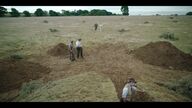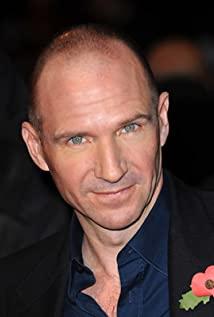The tomb of an ancient king, a complete warship, and a Merovingian tremissis coin from the sixth century AD that is still shining today, prove that the people living on this land are not only Vikings, but also Anglo-Saxon people. , This is one of the most important archaeological discoveries in British history.
And this movie not only digs deep into the story of the Anglo-Saxon battleship that took place in Suffolk in 1938, but also digs into the existence of people.
There's nothing holding it, except time.
The director refuses to bring the audience into a new and bright narrative, but chooses to involve the audience in a dusty memory that is obscure, ups and downs, and the elapsed time seems to flicker in a gradual arc of light, scenes and scenes like layers of waves. Some surges spread, some receded and faded, intertwined with delicate wave-tip foam.
In many scenes, no one opened their mouths, but the conversation in the ears permeated in softly, soaking the whole picture.
We die. We die and we decay. We don't live on.
Death and immortality, heritage and history, grand propositions, and thousands of years of time span are all smelted and weighed in a small family of three. The boy Robert had never met with his captain's father, and he consciously repeated the warning of the people around him, "You must take care of your mother". Mr. Pretty fell in love with Edith when she was 17 years old and he failed to propose to her. For the next 13 years, he would propose to her again on her birthday every year. But soon after they got married, the war was between them. There was a cold stone monument in between, leaving Edith alone to endure the pain, watching a couple of love birds in the streets and lanes of London, about to be carried forward by the torrent of history, and stepping towards a similar ending to them. As Basil Brown said:
We all fail. Every day. There are some things we just can't succeed at. No matter how hard we try.
On the one hand death, while burning its passion, on the other side tragedy, while shining its glory.
After the collapse, the scene where everyone rescued with their bare hands, the rising shots gave this life-and-death moment a different kind of poetry and beauty-the digger excavated the history of being buried under the dust, and was immediately buried by the dust and became the object of excavation. .
This is especially true for the pilot’s death: here is the burial of a young life of ten or twenty years old, and the first sight is a farewell; on the other side, a deadly deceased person is excavated, and one can see it over a thousand years. Digging and being digging, digging and burying, inspire a new understanding of existence.
On the deck of the ancient warship, Basil Brown wondered how many people transported the warship to the fields back then, how many hymns resounded across the sky and disturbed the Nightingale countlessly-Edith needs the same number of people to come to today's release banquet. This covenant pays the same amount of praise to Brown-the excavator and the unearthed are like a spiritual communication destined, under the veil of old wood and new grass, in the thick coffin of gravel and mud deposited for thousands of years, Miraculously, they recognized each other in the long history, and built a bridge, and then they were closely linked together, and they were praised for future generations.
The work isn't about the past or even the present. It's for the future. So that the next generations can know where they came from. It's the line that joins them to their forebears.
Ralph Fiennes’s performance is always amazing, although his role is gradually decentralized as the film is halfway through and the group line parallels, but afterwards, in every long or short shot, even if there is only a glimpse, he appears. It can add a new level, color and granularity to the character through extremely condensed and subtle interpretation.
The most touching thing is the ending. The boy took his timeless mother out to sea. The boy sailed the warship away in the blood river where the Anglo-Saxon people fought bloody battles, sailed out of the atmosphere, sailed to the splendid galaxy, and brought the queen back to her hometown. . Edith, who had choked "Not yet" in front of her husband's tomb, was beside her son. At this moment, the vast and unfamiliar universe became her hometown. She no longer feared death or being buried.
We're coming towards the edge of the atmosphere. Can you see it, Mother? We're sailing into the cosmos.
Orion's Belt, to take the Queen home.
This boat's hers. Her people gave her treasure for her home voyage. And she was sad when the ship came. Because she knew she'd be leaving everyone behind. And she was worried that they wouldn't get on very well without her. But she knew she had to follow the King into the sky. And so, she set off, through the Earth and up into the cosmos.
Space is a funny thing. Time operates quite differently up there, and five hundred years can pass in a flash. And the Queen looked back down to Earth. She could see that her son had grown up, and that he was now a space pilot . And she knew that when he made his first journey up to the stars, she would be there to meet him.
As a result, the countless people who have existed in the grand space and time have not only always existed and passed on at the invisible atomic level, but also have an eternal dialogue in the discovery and burying-human beings, and even all creatures in the natural world, living, Or the ones who have passed away long ago are connected as a whole in this way.
From the first human handprint on a cave wall, we're part of something continuous. So we don't really die.
View more about The Dig reviews











